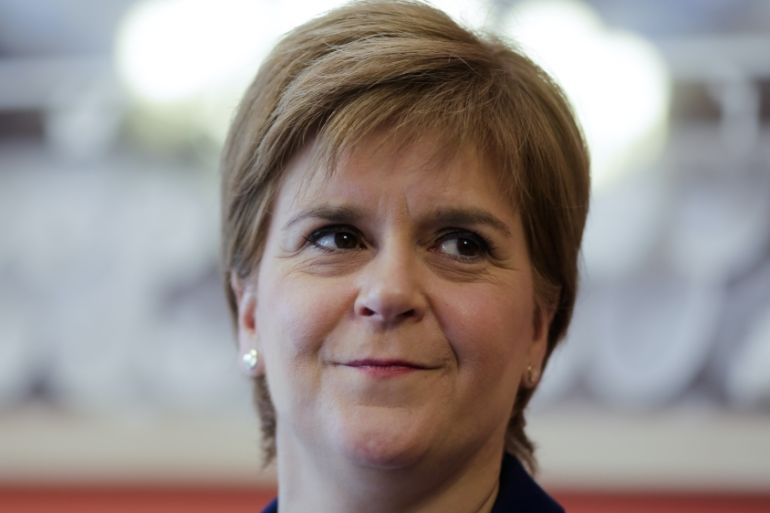Coronavirus sparks a nationalist surge in Scotland
The UK government’s inept response to the COVID-19 pandemic has put Scottish independence back on the agenda.

The constitutional future of the United Kingdom has never looked less certain.
According to the latest polling data, 54 percent of Scots want Scotland to become an independent country, compared with 46 percent who back the Anglo-Scottish Union.
Support for First Minister Nicola Sturgeon’s pro-independence Scottish National Party (SNP) is running at record highs, too.
The SNP is on course to win an overall majority at the Scottish Parliamentary elections next May; its signature demand is another referendum on the break-up of Britain.
The coronavirus crisis is the immediate catalyst behind Scotland’s nationalist surge.
The UK government’s response to the outbreak, led by Conservative Prime Minister Boris Johnson, has been inept.
Late into lockdown and early to emerge out of it, the UK, with an estimated 65,000 excess deaths, has one of the world’s worst COVID-19 death rates – a trend compounded by Johnson’s confused and contradictory messaging around public health.
Sturgeon, by contrast, has appeared calm and composed throughout the pandemic.
Instead of rushing, like Johnson, to reopen the economy, the Scottish first minister – who controls Scotland’s health and policing policies from Edinburgh – has kept certain Scottish lockdown restrictions in place even as they have been lifted in England, thus slowing the spread of the virus north of the border.
The political effect of these (modestly) divergent strategies has been dramatic – Sturgeon’s approval rating among Scottish voters now sits at plus 60 percent; Johnson’s, meanwhile, languishes at minus 40.
The roots of Scottish discontent predate COVID-19, however, and point to a more entrenched set of divisions.
The UK has elected three Conservative governments since 2010, each one rejected, consecutively, by the Scottish public.
Over the past 10 years, Conservative politicians in London have imposed a series of sweeping changes on British society – radical cuts to public spending, a draconian overhaul of the welfare system, ever-tightening border controls – that have chipped away at Scottish enthusiasm for the Union.
Johnson’s electoral victory last year was a decisive moment.
The Conservatives may have won the bulk of English constituencies on December 12, routing Labour in its working-class heartlands and fundamentally reshaping England’s political landscape.
But in Scotland, they lost ground, shedding seven of their 13 seats as the SNP swept the boards.
Arrogant, opportunistic, and out of his depth, Johnson himself is a major liability to Scottish conservatism and, therefore, to the long-term survival of the UK.
The collapse of unionist sentiment in England, linked to Brexit, has been another key development.
One poll, published in 2019, showed that 63 percent of Conservative Party members would be happy for Scotland to become independent if it meant England could complete its departure from the EU without disruption; a separate poll indicated that three-quarters of Conservative Brexit voters in England felt the same way.
Analysis reveals the shape of Scotland’s emerging nationalist majority.
Seventy percent of Scots under the age of 35 believe Scotland should leave the UK; almost 40 percent of Labour voters favour independence; crucially, support for independence is now as strong among middle-class Scots as it is among working-class Scots, which was not the case when Scotland first voted against separation in September 2014.
One irony here is that the SNP has barely campaigned for independence in recent months.
Indeed, Sturgeon has urged nationalist activists to stay off the streets until the COVID-19 pandemic is fully contained – albeit chiefly for safety reasons.
Grassroots organising may not even be necessary at this stage: the Conservatives are engaged in an elaborate act of constitutional self-sabotage.
Austerity, Brexit, the unique toxicity of Johnson to the Scottish electorate, Westminster’s catastrophic mishandling of the coronavirus pandemic – these factors have combined to push Scots into the arms of the SNP, despite widespread misgivings about the economic case for self-determination.
The last time a shift like this occurred was in the 1980s, when Scottish voters coalesced around the idea of Home Rule within the UK as a means of insulating Scotland from Margaret Thatcher’s free-market reforms.
The Conservatives blocked devolution until they were turfed out of power by Tony Blair in 1997; Blair’s government then legislated for the creation of a Scottish Parliament, Holyrood, which was established in 1999.
Sturgeon argues that Holyrood should be free to call a second referendum on independence at a time of its choosing and without Westminster’s consent; most Scots agree.
Yet, the Conservatives insist London remains sovereign – and it is possible Johnson will simply dismiss Sturgeon’s request for a rerun of the 2014 vote, regardless of how high support for independence rises or the results of next year’s poll.
There would be a cost to this kind of obstructionism: Scots would soon conclude that their presence in the Union is not voluntary. Independence and democracy would become synonymous concepts in Scottish political culture, and the UK would forfeit what is left of its dwindling legitimacy.
Johnson might decide that is a price worth paying, provided someone else – a future Labour prime minister, for instance – ultimately foots the bill.
Alternatively, he could agree to a referendum with the aim of defeating independence and puncturing the SNP’s momentum, once and for all.
Neither option is risk-free.
If the COVID-19 pandemic has taught us anything about British politics, it is that Johnson is not the sort of leader who thrives under crisis conditions; Sturgeon, on the other hand, very much is.
The views expressed in this article are the author’s own and do not necessarily reflect Al Jazeera’s editorial stance.
